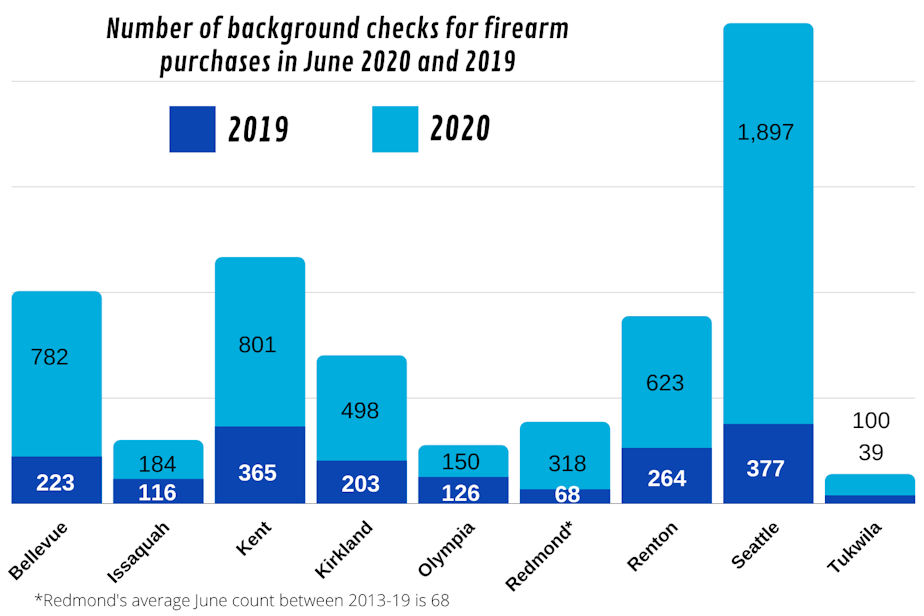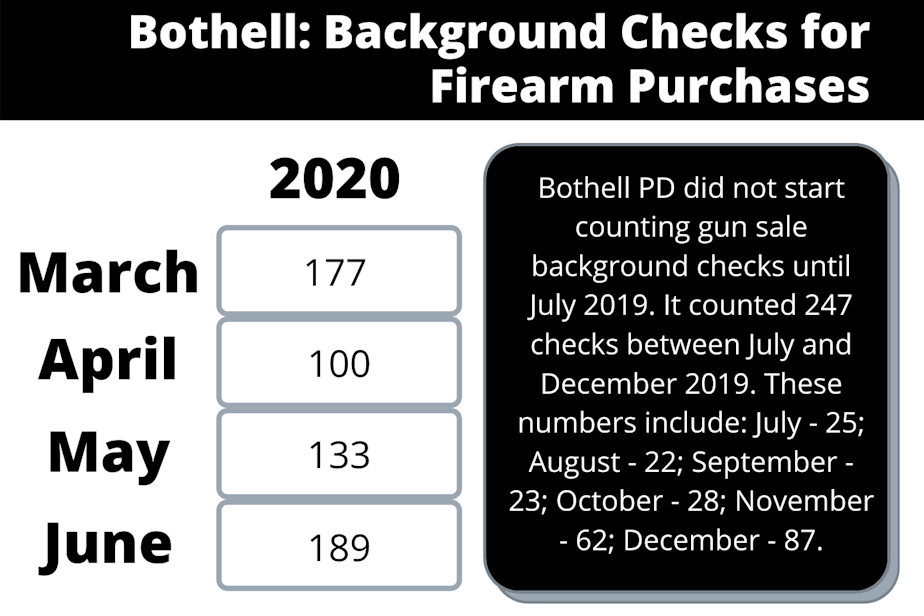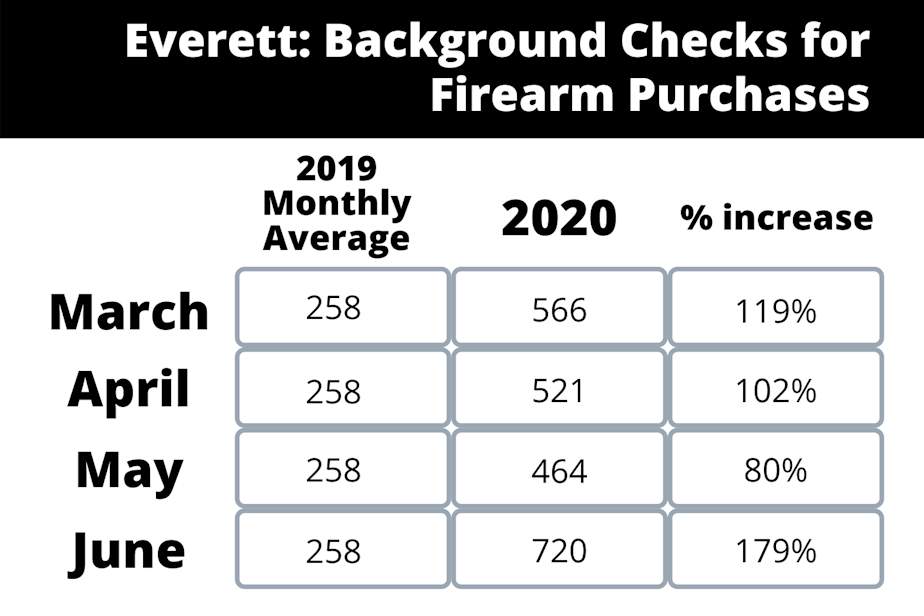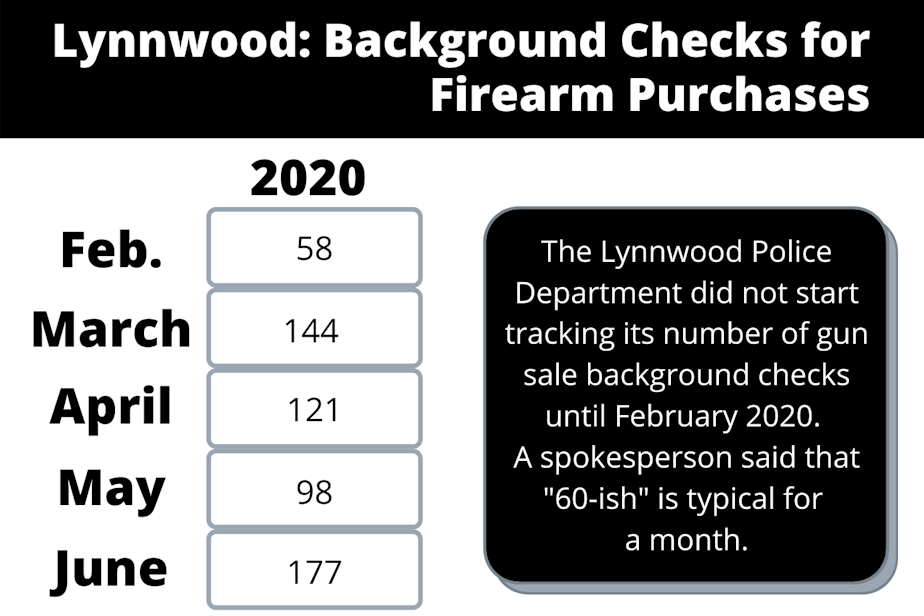Gun sales continue to surge across the Seattle-area
After an initial spike in March, western Washington firearm sales remained far higher than usual over the first half of 2020.
Some point to the pandemic, others point to protests over racial injustice as prompting waves of sales. In the end, it has local officials noticing that a lot more guns have arrived in their communities.
When a customer purchases a firearm in Washington state, they must wait 10 business days before receiving the gun (for most types of firearms). During that time, the seller submits the customer's information to their local police department for a background check.
In the first seven months of 2020, Seattle processed 9,426 background checks for gun sales. That is already a 55% increase over the city's average for an entire year.
Seattle is not alone. Comparing background checks, June 2020 to June 2019:
- Kirkland saw a 145% increase.
- Kent saw a 119% increase.
- Redmond, a 268% increase. The last seven Junes have averaged 68 background checks. This June saw 318 background checks.
More details and numbers for cities and background checks for gun sales are listed below in this article.
Sponsored

Gun sales
The numbers are generally the same across western Washington communities: Gun sales spiked in March, when the coronavirus started spreading in region, then lowered (though still remaining higher than normal). Then sales jumped higher in June.
A couple points to understand about these numbers:
- The actual number of guns sold is larger than the number of background checks. Only one background check is required per transaction, but the customer could be purchasing multiple firearms. Example: In June, Bellevue police processed 782 background checks; 41 were for transactions involving multiple firearms. Read more about Bellevue's previous gun sale spike here.
Also, background checks performed by local law enforcement agencies are not required for all types of firearm sales -- they are mostly used for assault rifles and pistols. Other types of firearm sales could be run through a federal background check, commonly known as NICS. Those sales are not represented in this article.
- The number of background checks for firearm purchases does not reflect the number of guns sold in a city. Rather, they represent where the customers live. Example: if a customer buys a gun at an Edmonds store, but they live in Seattle, the Seattle Police Department runs the background check.
Sponsored
Online searches for local gun stores also indicate that western Washington residents have been seeking out their local shops. Between January and July, people in the Seattle-Tacoma metro area searched for gun stores more than anywhere else in the state.
Washington's gun-buying surge aligns with a national trend. The Brookings Institution estimates that nearly three million more guns were sold than normal between March and June. Half of that jump occurred in June alone.
National firearms sales were higher in June than any other time on record (dating back to 1998).
Why the surge?
Sponsored
The recent assessment by the Brookings Institution concludes that pandemic fears initially spiked national firearm sales, but also states that nationwide protests over racial injustice in late May and June further prompted sales.
Those events also correlate with Washington's sales. When the coronavirus pandemic prompted lockdowns in March, gun sales spiked. The next spike was in June, coming on the heels of protests, the reopening of many businesses, and the easing of pandemic restrictions.
Deputy Scott Wilson with the Kitsap County Sheriff's Office said he believes the pandemic is the reason for increased gun sales in his area. He has observed that people buy more guns during insecure times.
"Whether or not people believe it is going to be an apocalypse, everyone for themselves, or 'The Purge,' one of those deals -- who knows?" he said. "We also saw this during the recession.”
Kitsap County is across Puget Sound from Seattle; its population is roughly a third the size. Still, officials there noticed the spike in sales. The department doesn't keep an official count, but it was forced to add an extra staff member to handle the increased task of gun sale background checks (they increased staff to three people, up from two).
Sponsored
“Everybody is very polite," Deputy Wilson said. "We’ve only had a handful of cases where people demand they are processed faster."
When KUOW reported on the initial spike in gun sales in early March, a gun store employee was overheard saying sales haven't been so high since 9/11. Wilson recalled the 9/11 gun-buying spike. But he argues that pandemic sales are much different.
"This is not the same as we saw on 9/11," he said. "9/11 was about personal security and security of my neighbors .... Now, we have a threat caused by factors out of somebody’s control. I think that is the whole issue, in my opinion. It’s all a matter of having control, what little you can exert over your circumstance."
Western Washington firearm purchases
Below are the numbers of background checks that various local law enforcement departments have conducted for the sales of firearms in recent months.
Sponsored
Different departments manage these records in various ways -- if at all. Details vary from city-to-city. Example: The Bainbridge Island Police Department shreds all requests for gun sale background checks once they are completed and does not keep a record of how many they perform. Bellevue, on the other hand, tracks how many they've processed and how many transactions were for multiple guns.
Bellevue
Bellevue's past firearm background checks also include: August 2019 - 182: September 2019 - 160; October 2019 - 144; November 2019 - 118; December 2019 - 205; January 2020 - 150.
With a median income of more than $112,000, Bellevue residents are generally wealthier than many neighboring communities. Of its 148,000 residents, 55% are white and 35% are Asian. Thirty-eight percent of Bellevue residents were born outside of the United States.
Bothell

Bothell has more than 47,000 residents who are 71% white and 15% Asian, and a median household income of $95,000. A total of 20% of Bothell residents were born outside the United States.
Everett

There are more than 111,000 residents in Everett, who are 74% white and 16% Hispanic or Latino. A total of 19% of Everett residents were born outside the United States.
Issaquah
Issaquah has nearly 40,000 residents who are 68% white and 21% Asian. The median household income is nearly $102,000. A total of 26% of Issaquah residents were born outside the United States.
Kent
Kent has 132,000 residents who are 48% white, 20% Asian, 16% Hispanic/Latino, and 13% Black or African American. Median household income in about $69,000. A total of 30% of Kent residents were born outside the United States.
Kirkland
There are 93,000 residents in Kirkland, who are 76% white and 14% Asian. The median income is nearly $110,000. A total of 23% of Kirkland residents were born outside the United States.
Kitsap County Sheriff's Office
The Kitsap County Sheriff's Office does not keep a record of the number of gun sale background checks it processes. Officials have noticed a "dramatic" rise in the number they are processing, however. Anecdotally, a Sheriff's spokesperson guessed they were up by 50%. KCSO has added an extra staff member to help with the increased demand (three staff members total).
There are more than 271,000 people living in Kitsap County, who are 83% white, and have a median income of $72,000.
Lynnwood

There are 39,000 residents in Lynnwood, who are 60% white, 18% Asian, 18% Hispanic or Latino. The median income is $59,000. A total of 30% of Lynnwood residents were born outside the United States.
Olympia
There are 53,000 people living in Olympia, who are 83% white and have a median income of $59,000.
Redmond
There are 72,000 residents in Redmond, who are 56% white and 35% Asian. The median income is more than $123,000. A total of 41% of people in Redmond were born outside the United States.
Renton
Just under 102,000 people live in Renton. It is 49% white, 10% Black or African American, 23% Asian, 14% Hispanic or Latino. About 29% of Renton's residents were born outside the United States. The median household income is $75,000.
Seattle
With a population of just under 754,000, Seattle is 68% white, 15% Asian, and 7% Black or African American, and 7% Hispanic or Latino. A total of 19% of Seattle residents were born outside the United States.
Tukwila
With around 20,000 residents, Tukwila is a relatively small city compared to its neighboring communities. It's 37% white, 25% Asian, and 17% Black or African American. A total of 41% of Tukwila's population was born outside the United States. The median income is $57,000.
This article may be updated in the future with additional information from police departments.

